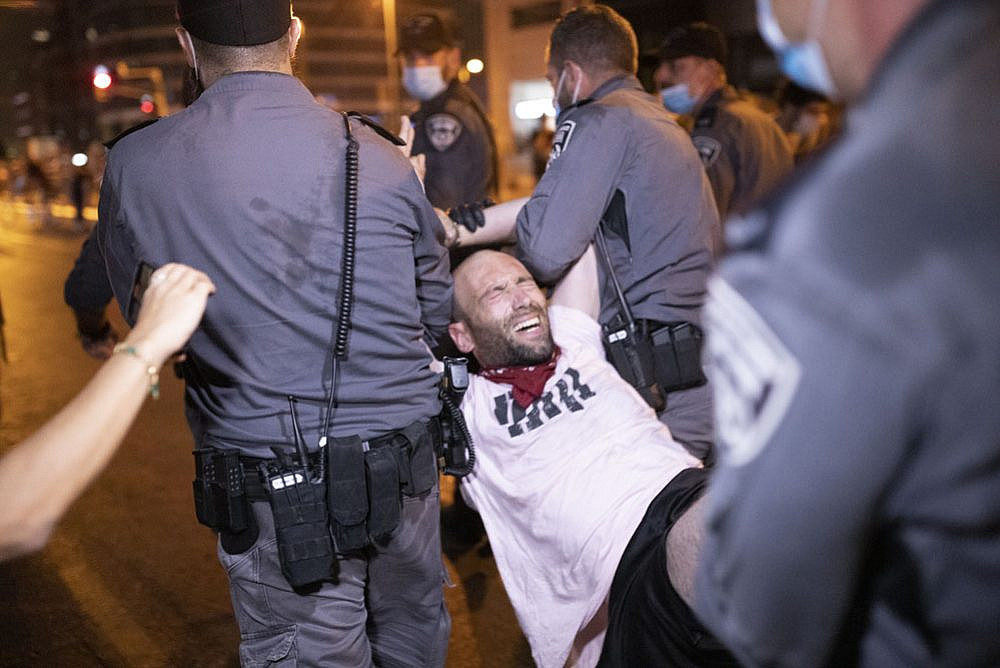In mid-March, after COVID-19 landed in Israel, Prime Minister Benjamin Netanyahu gave a prime-time televised press conference in which he declared “war” on the pandemic.
Those were the early days of the coronavirus, when much of the world was watching the harrowing scenes coming out of countries such as Italy, Spain, and France. Netanyahu, vowing to defeat the “invisible enemy,” deployed the Shin Bet, Israel’s internal security service, to surveil millions of Israeli citizens, while the country’s security apparatuses jumped into high gear to try and beat the virus into submission. Very little was done by way of propping up civilian infrastructure or building the citizenry’s trust.
Eight months later and not much is left of Netanyahu’s cris de guerre. Israel has gone through two deadly waves of COVID-19, and is facing a wrecked economy and an increasingly disobedient population tired of government mismanagement. The end is nowhere in sight, yet the Israeli government doesn’t seem to be changing its tune, and the security establishment remains firmly in charge of steering the country through the crisis.
If you ask Yagil Levy, a professor of sociology at Israel’s Open University, there’s a word for that: “securitization.” The term was coined by the Copenhagen School for International Relations to describe the post-Cold War phenomenon in which Western democracies began framing purely civilian issues such as immigration, crime, natural disasters, and climate change as issues of national security.
Under securitization, governments try to convince the public that what the state is actually dealing with is a security issue, and thus it needs to adopt various kinds of conduct that go beyond politics as usual. Doing so, Levy says, often grants legitimacy to the violation of civil rights or the consolidation of power with the executive branch.
According to Levy, who is best known for his extensive writing on militarism and ethnic divisions in the IDF, in a highly-militarized country such as Israel, securitization is not only a handy solution that the government can implement at a whim — it’s the only way Israel knows how to deal with emergency situations.
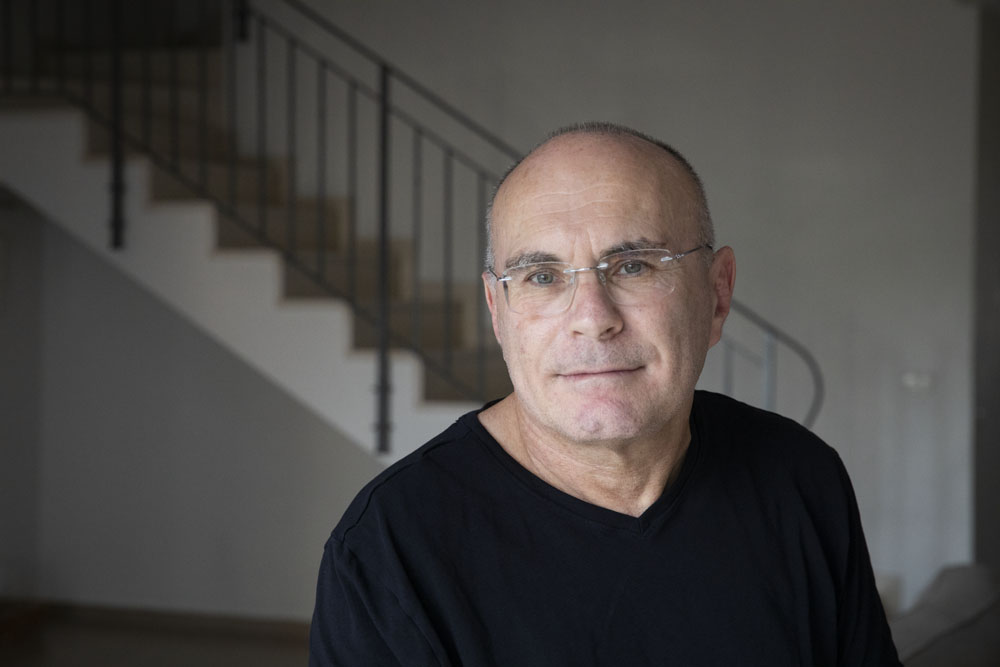
I spoke to Levy at the height of Israel’s second lockdown, as COVID-19 levels were spiking across the country and citizens were taking to the streets to demonstrate against the government’s ban on protests. We discussed the difference between “security” and “securitization,” why Israel’s attempt to vanquish the pandemic was doomed from the start, and how five decades of military rule over the occupied territories have affected Israel’s regime of securitization.
This interview has been edited for length and clarity.
Upon its founding, Israel inherited the British Mandate’s Emergency Regulations, which effectively means the country has been in a continuous state of emergency since 1948. Is securitization part of Israel’s DNA?
To answer that, we need to go back to the difference between “militarism” and “securitization.” Many of the processes that Israel underwent since its founding were militaristic ones, which meant that policies vis-à-vis Israeli citizens were viewed through the prism of national security. This included the IDF’s size and the budget, the dispersing of new immigrants across the country to consolidate its borders, and the way the education system prepares students for the army.
Securitization, by contrast, refers to government policies that use the security establishment to respond to purely civilian problems. COVID-19 is a perfect example: we can view the pandemic either as a public health issue, or as a security threat, as Israel currently does. That decision has a dramatic influence on public discourse as well as on policy.
It reminds me of what Italian philosopher Giorgio Agamben said at the start of the pandemic — that this moment is just an excuse for states to exert their “techno-medical despotism” and violate the lives and privacy of their citizens.
There is a big difference between claiming that governments are cynically exploiting the current moment in the name of security, as Agamben does, and asking how liberal democracies should deal with the pandemic.
But this kind of discussion is foreign to Israelis. The bon ton in the United States, Canada, Western Europe, Australia, and other countries is that this is a civilian crisis that, while it compels us to take exceptional measures, still needs to be dealt with through civilian channels. Nowhere, apart from non-democratic countries like Jordan or China, did we see securitization at the level we do in Israel. Here, the security establishment was invited to take the driver’s seat.
What’s unique about the way Israel is dealing with the COVID-19 crisis?
In the beginning, the National Security Council — with some encouragement from the prime minister — took control of the response, thereby turning the pandemic into a security event that was treated as such by military correspondents in the media.
The next thing we know, the Institute for National Security Studies held a war game simulating a cabinet session about the coronavirus crisis. The Shin Bet is granted powers that go beyond the reach of any security agency in the West. The Mossad obtains protective gear and medical devices from abroad.
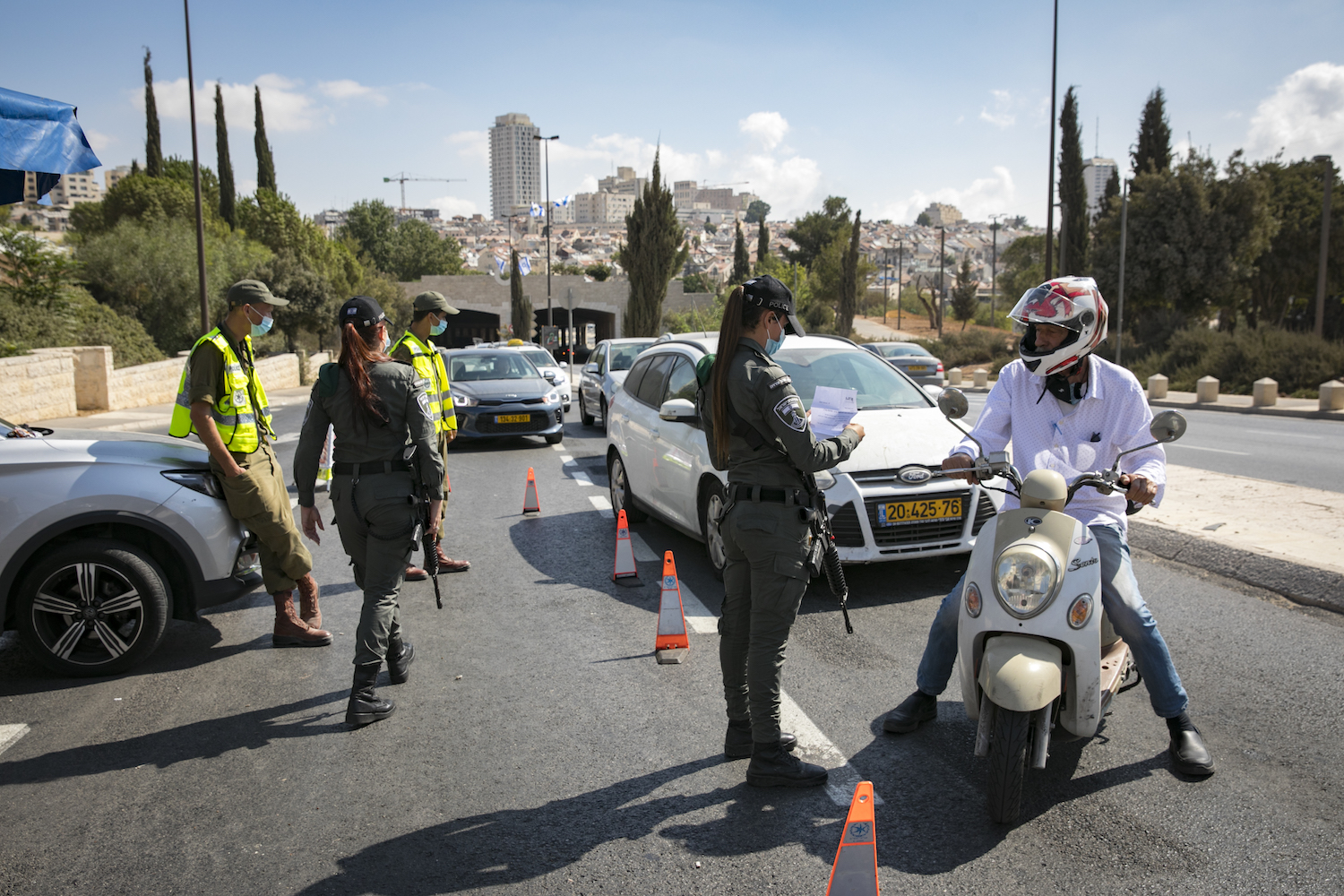
Meanwhile, the Military Intelligence Directorate, which helped run the response in the initial stages of the first and second coronavirus waves, issues regular reports of the pandemic’s spread and possible scenarios that may arise from it. This type of army intervention is absurd and doesn’t happen anywhere else.
It is true that the security establishment has the knowledge and ability to deal with this situation. But France, Spain, and Italy are facing the same pandemic; while their security establishments are taking on some civilian roles like transporting medicine or ventilators, none of them thought the army should play a central role in fighting the disease.
In Israel, the primary tool being used to fight the pandemic is lockdown. There is much public debate about what the lockdown will look like or how long it will last. But beyond that, there is little by way of solutions.
Right. This is different from what is happening in other Western countries, where the citizenry focuses on the state of the public health sector, or what kind of welfare packages the government should provide to its citizens. In other places, you’ll see minimal and localized lockdowns that are self-enforced by the citizens themselves. In Israel, the lockdown has turned the citizens into an enemy who needs to be aggressively policed.
You’re saying that the Israeli government is actively turning its citizens into the enemy by the mere fact that they may contract the virus?
It’s a matter of strategy. The government asks itself whether it wants to defeat the virus, or to learn to live with it without destroying the economy. If it chooses the former, then the state needs to protect its citizens against themselves. You would need to increase policing, by which you turn every citizen into a potential enemy against whom violence can and should be used if they violate the national health directives.
Civil society and local governments have an extremely important role to play. A prime example is the way the Jerusalem Municipality is dealing with the pandemic in East Jerusalem. Palestinian civil society groups are now working with the municipality to hand out food to local residents, while a committee was established to help run East Jerusalem’s first coronavirus hotel with the financial support of Palestinian businessmen. They are filling the vacuum that the government has left behind.
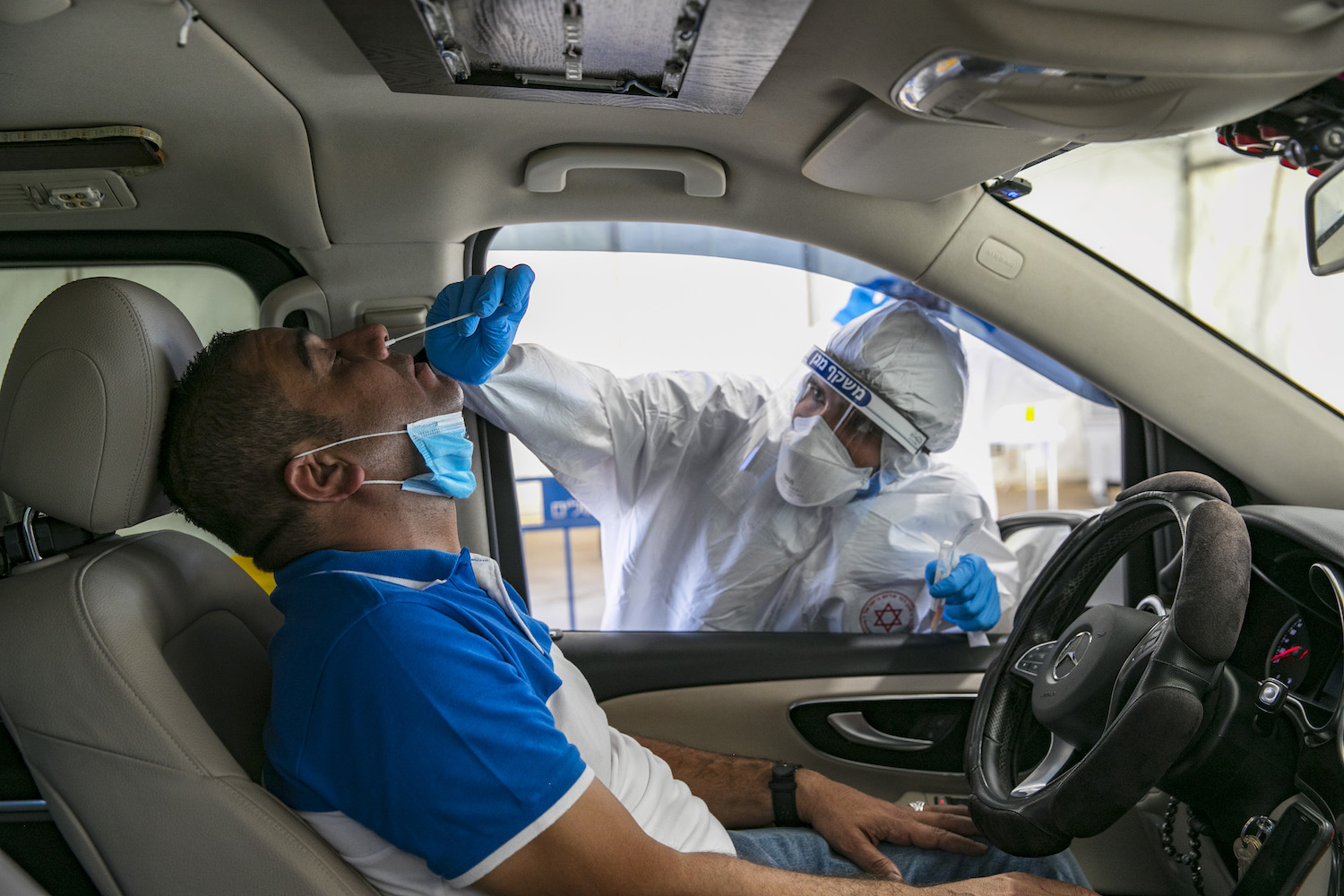
When civil society realizes it has a role, it can overcome the mechanisms of policing. The problem is that in Israel we do not encourage the strengthening of civil society. When the public discourse is securitized, anyone who carries the virus is deemed an enemy. So, instead of massive police enforcement and limiting freedom of protest — a uniquely Israeli phenomenon — the government should be working to win the public’s trust.
It seems like there are few forces in Israel that are fighting against securitization, or even putting forth an alternative to this framework.
One thing that makes securitization difficult to combat is that the security establishment has the public’s trust, making it much harder to challenge. In April, Haaretz reported that the IDF Home Front Command was gathering intelligence on civilians to try and gauge the possibility of a civil uprising; there was hardly any public debate on the matter.
The same happened with a recent media report that the Military Intelligence Directorate was given the right to receive information on all Israeli citizens from the Israel Tax Authority; no one can explain why this is happening, but even more concerning is that very few people seem to care. Or take a recent report that said the Home Front Command has begun enlisting ex-Shin Bet agents to gather intelligence on Arab communities in Israel, including the Druze.
What are the long-term effects of these government policies? Is there any way we will ever be able to put the genie back in the bottle?
First, we’re already seeing a number of healthy phenomena, including citizens refusing to give up on their right to protest.
Second, there is what we call the ratchet effect. Particularly after September 11th, we have seen that governments and security institutions are not keen on relinquishing the power they have amassed. These include Israel’s Home Front Command and the Shin Bet, which will affect the speed and ease with which Israel can respond to future crises.
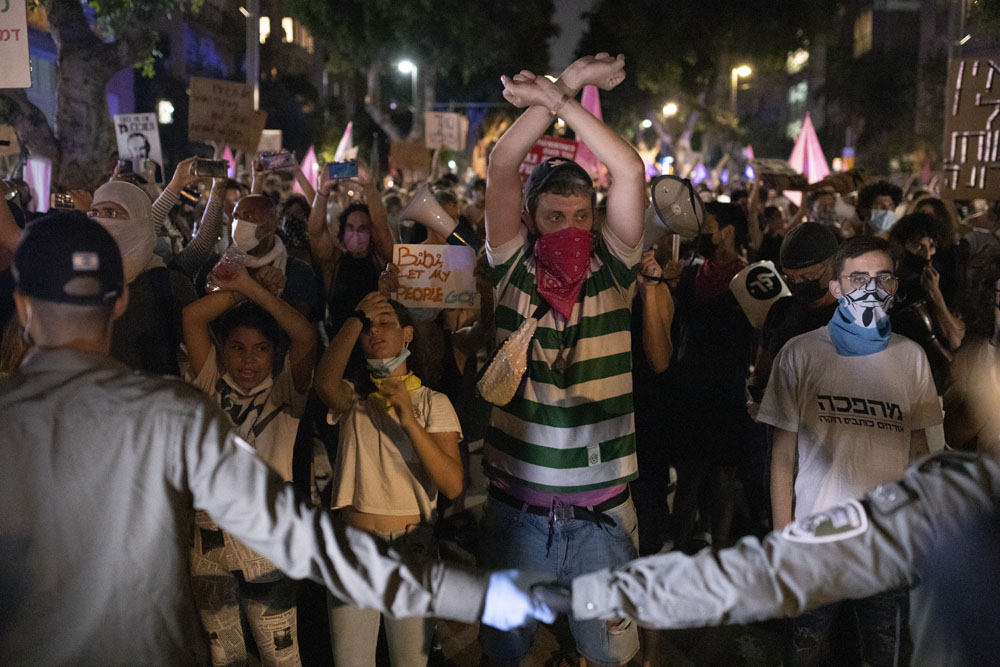
The government’s focus on controlling the virus and flattening the curve also means that it dramatically neglects things like the economy, the elderly, and the sick. This is a worldview that is based on fighting an enemy and putting everything aside until the enemy is defeated.
The more these security tools are successful in fighting the pandemic, the easier it will be for them to become a part of Israel’s arsenal. They are not working, though, and the public is beginning to doubt how effective these tools actually are.
Could securitization work as a short-term solution to such crises? Was it unacceptable for the government to use these tools from the moment the pandemic hit?
In my eyes it was always unacceptable, but I also understand that Israel doesn’t know any other way to act. Israel is a centralized state with relatively weak local authorities and civil society. People here have a security mindset, and the power of the state’s security apparatuses is enormous.
But securitization should have been avoided in Israel from day one [of the pandemic]. We should have asked ourselves how to deal with the virus while protecting the population. It would have meant putting far more emphasis on building trust with Israel’s different communities, while delegating powers to local authorities and civil society, rather than instituting a regime of enforcement. This should have happened in the first wave, but it especially needs to happen now in the second wave when the security discourse is so dominant.
There have been efforts by coronavirus czar Ronni Gamzu to implement the “traffic light” program, which seeks to address each city and town based on its morbidity rate. We buy so wholeheartedly into the idea that the pandemic can only be defeated through military might that we hardly hear anyone talking about non-security-based alternatives.
Even when the traffic light plan was implemented, the local authorities received very little backing from the national government. Their only incentive was to make sure their cities turned “green.” Yet the government gave no additional tools or resources to the local authorities. There was no discussion about cultural differences between localities, or about the wealth disparities between cities like Tel Aviv and those such as Tira and Kufr Qassem.
So, what does Israel inevitably do when civilian plans like the “traffic light” program fail? It returns to its military infrastructure.
Activists have for years been saying that the effects of decades of military rule over a civilian population in the occupied territories will inevitably creep into Israel proper. Today that claim seems more relevant than ever, especially as police have been using violence against the mostly middle- and upper-class Jewish Israelis protesting Netanyahu’s lockdown orders.
I have a hard time accepting this theory of “creeping oppression,” as it is part of a broader conversation that focuses on the price Israelis pay for the occupation. The occupation has one price for Israelis, and it is a moral one. The actual cost we pay for the occupation is secondary, especially since many groups in Israeli society actively benefit from it.
But is there a direct relationship between what we’re seeing in these protests and this so-called creeping effect?
I have a hard time believing so. Look at what is happening in some Eastern European countries like Hungary: those with traditions of democracy that aren’t as deeply entrenched or that are beset by inter-cultural struggles are now seeing the state assert its power.
Nonetheless, the creeping effect does remain relevant. First, because it creates a surplus of resources and excessive control that Israel can use effortlessly and with great flexibility. Second, because Israel can gather knowledge on how to control the West Bank’s civilian population, which has led to a “liberalization” of its control over the occupied territories in the last decade.
The collapse of the Oslo model — which sought to replace direct control over the Palestinians by outsourcing it to the Palestinian Authority — was followed by the failure of what Israeli sociologist Baruch Kimmerling called “politicide” against the PA during the Second Intifada. This, coupled with criticism of Israel’s policies by human rights organizations, has led the Shin Bet to develop more indirect methods of controlling the Palestinian population, such as monitoring Palestinians on social media.

This is why the Shin Bet’s new, sophisticated methods are viewed as a kind of “re-enlightened occupation,” which cuts human costs and can be used “at home” [in Israel proper]. And all this is taking place as the occupation is no longer of interest to Israelis — because the occupation has become cheap and easy to carry out.
Is there anything optimistic about this moment?
Yes. What we’re seeing in the protests is the return of extra-parliamentary democracy, in which decisions are made by the people in the streets. The [protesters] are unafraid of standing up to the government. No less important is their willingness both politically as well as when it comes to their health, as a result of the government’s unsophisticated attempt to force people into lockdown without so much as providing them with [economic] protection or trust.


